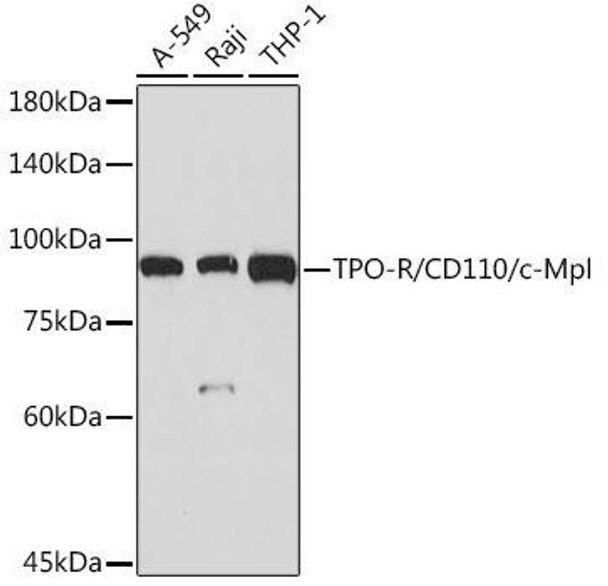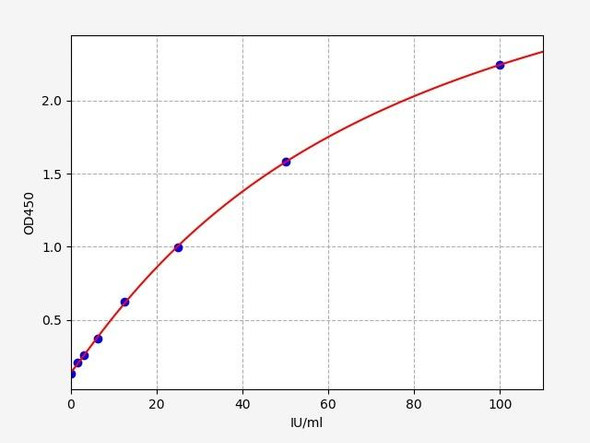Anti-TPO-R/CD110/c-Mpl Antibody (CAB19729)
- SKU:
- CAB19729
- Product type:
- Antibody
- Antibody Type:
- Monoclonal Antibody
- Reactivity:
- Human
- Mouse
- Rat
- Host Species:
- Rabbit
- Isotype:
- IgG
- Synonyms:
- C-MPL
- CD110
- MPLV
- THCYT2
- TPOR
Description
| Product Name: | TPO-R/CD110/c-Mpl Rabbit mAb |
| Product Code: | CAB19729 |
| Size: | 20uL, 50uL, 100uL |
| Synonyms: | C-MPL, CD110, MPLV, THCYT2, TPOR |
| Applications: | WB |
| Reactivity: | Human, Mouse, Rat |
| Host Species: | Rabbit |
| Immunogen: | A synthesized peptide derived from human TPO-R/CD110/c-Mpl |
| Applications: | WB |
| Recommended Dilutions: | WB 1:500 - 1:2000 |
| Reactivity: | Human, Mouse, Rat |
| Positive Samples: | A-549, Raji, THP-1, Mouse liver, Mouse spleen, Mouse heart, Rat liver |
| Immunogen: | A synthesized peptide derived from human TPO-R/CD110/c-Mpl |
| Purification Method: | Affinity purification |
| Storage: | Store at -20°C. Avoid freeze / thaw cycles. Buffer: PBS with 0.02% sodium azide, 0.05% BSA, 50% glycerol, pH7.3. |
| Isotype: | IgG |
| Sequence: | Email for sequence |
| Gene ID: | 4352 |
| Uniprot: | P40238 |
| Calculated MW: | 82kDa |
| Observed MW: | 80KDa |
| UniProt Protein Function: | Function: Receptor for thrombopoietin. May represent a regulatory molecule specific for TPO-R-dependent immune responses. |
| UniProt Protein Details: | Subunit structure: Interacts with ATXN2L. Ref.8 Subcellular location: Membrane; Single-pass type I membrane protein. Tissue specificity: Expressed at a low level in a large number of cells of hematopoietic origin. Isoform 1 and isoform 2 are always found to be coexpressed. Domain: The WSXWS motif appears to be necessary for proper protein folding and thereby efficient intracellular transport and cell-surface receptor binding.The box 1 motif is required for JAK interaction and/or activation. Post-translational modification: Ubiquitination at Lys-553 and Lys-573 targets MPL for degradation by both the lysosomal and proteasomal pathways. The E3 ubiquitin-protein ligase CBL significantly contributes to this ubiquitination. Involvement in Disease: Congenital amegakaryocytic thrombocytopenia (CAMT) [MIM:604498]: Disease characterized by isolated thrombocytopenia and megakaryocytopenia with no physical anomalies.Note: The disease is caused by mutations affecting the gene represented in this entry.Thrombocythemia 2 (THCYT2) [MIM:601977]: A myeloproliferative disorder characterized by excessive platelet production, resulting in increased numbers of circulating platelets. It can be associated with spontaneous hemorrhages and thrombotic episodes.Note: The disease is caused by mutations affecting the gene represented in this entry. Ref.9 Ref.13 Ref.14Myelofibrosis with myeloid metaplasia (MMM) [MIM:254450]: A chronic myeloproliferative disorder characterized by replacement of the bone marrow by fibrous tissue, extramedullary hematopoiesis, anemia, leukoerythroblastosis and hepatosplenomegaly.Note: The disease is caused by mutations affecting the gene represented in this entry. Ref.11 Ref.12 Sequence similarities: Belongs to the type I cytokine receptor family. Type 1 subfamily.Contains 2 fibronectin type-III domains. Caution: It is uncertain whether Met-1 or Met-8 is the initiator. |
| NCBI Summary: | In 1990 an oncogene, v-mpl, was identified from the murine myeloproliferative leukemia virus that was capable of immortalizing bone marrow hematopoietic cells from different lineages. In 1992 the human homologue, named, c-mpl, was cloned. Sequence data revealed that c-mpl encoded a protein that was homologous with members of the hematopoietic receptor superfamily. Presence of anti-sense oligodeoxynucleotides of c-mpl inhibited megakaryocyte colony formation. The ligand for c-mpl, thrombopoietin, was cloned in 1994. Thrombopoietin was shown to be the major regulator of megakaryocytopoiesis and platelet formation. The protein encoded by the c-mpl gene, CD110, is a 635 amino acid transmembrane domain, with two extracellular cytokine receptor domains and two intracellular cytokine receptor box motifs . TPO-R deficient mice were severely thrombocytopenic, emphasizing the important role of CD110 and thrombopoietin in megakaryocyte and platelet formation. Upon binding of thrombopoietin CD110 is dimerized and the JAK family of non-receptor tyrosine kinases, as well as the STAT family, the MAPK family, the adaptor protein Shc and the receptors themselves become tyrosine phosphorylated. [provided by RefSeq, Jul 2008] |
| UniProt Code: | P40238 |
| NCBI GenInfo Identifier: | 4885491 |
| NCBI Gene ID: | 4352 |
| NCBI Accession: | NP_005364.1 |
| UniProt Secondary Accession: | P40238,Q5JUZ0, |
| UniProt Related Accession: | P40238 |
| Molecular Weight: | 71,245 Da |
| NCBI Full Name: | thrombopoietin receptor |
| NCBI Synonym Full Names: | myeloproliferative leukemia virus oncogene |
| NCBI Official Symbol: | MPL |
| NCBI Official Synonym Symbols: | MPLV; TPOR; C-MPL; CD110; THCYT2 |
| NCBI Protein Information: | thrombopoietin receptor; TPO-R; proto-oncogene c-Mpl; myeloproliferative leukemia protein |
| UniProt Protein Name: | Thrombopoietin receptor |
| UniProt Synonym Protein Names: | Myeloproliferative leukemia protein; Proto-oncogene c-Mpl |
| Protein Family: | Thrombopoietin receptor |
| UniProt Gene Name: | MPL |
| UniProt Entry Name: | TPOR_HUMAN |





